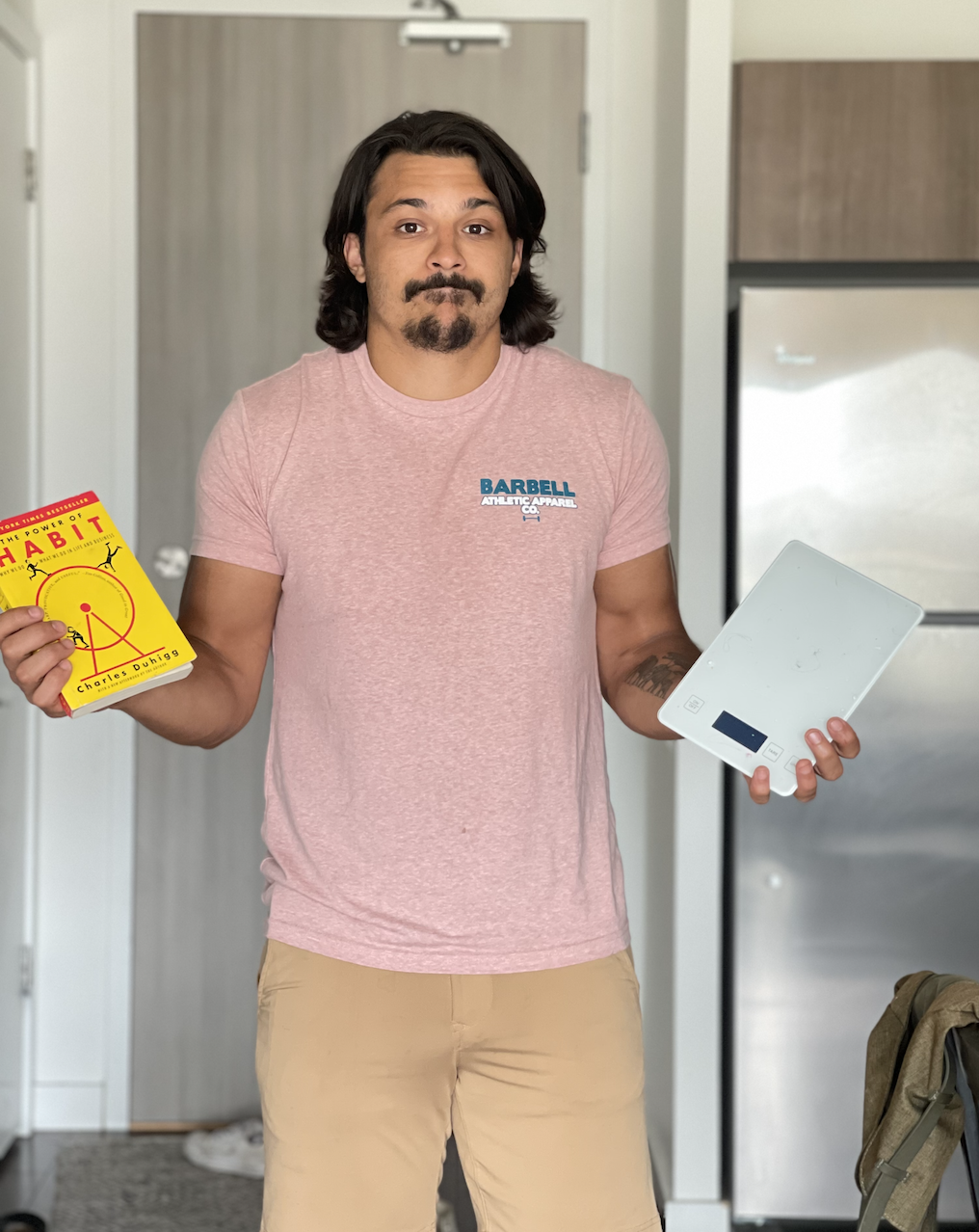When Does Tracking Calories Become More Necessary For Weight Loss?
It doesn’t need to be your first line of defence.
To focus on habits or to track calories? Or even a combination of both?
When it comes to weight loss, I’m sure you’ve heard a million different protocols, claims and secrets that will get you to your goal. This space has become saturated with countless claims. Some being more preposterous than others. All in all, there is still no shortage of mis and disinformation out there.
So let’s discuss a more common approach now. One that I stand behind and even use with my clients: Habit Formation.
I don’t want to talk about how to use it actually. Well, not as much as I want to talk about something relating to it. I want to talk to you about when habits alone, aren’t enough for fat loss. I want to discuss when a more in depth approach may be needed, such as tracking your calories. I also want to share an experience from one of my clients in the process.
The reason why habits are so damn important with your fitness goals, is because solidified habits will be what helps you keep your progress indefinitely. Habit change will help you become the person that would have those results.
A lean and physically fit person isn’t simply a result of eating less calories and working out. Sure, doing those two things will usually have you trending toward less body fat (via less calories) and more general fitness (via more exercise). But what keeps an individual consistent with these behaviours, will be more contingent on their habits.
For example:
If they habitually don’t schedule workouts, don’t prepare food and get less sleep, then these behaviours will all be harder to have consistently.
On the contrary, if they habitually prioritize and schedule their workouts, prepare most food in advance and make sure to get 7–8 hours of sleep, then it will be a lot easier to consistently lock down these behaviours.
That is why habit formation is so crucial to the achievement and maintenance of your fitness goals.
Now, onto the caveat. The caveat of when tracking calories becomes more necessary in a fat loss goal. Rather than solely focusing on habit change.
I have story about a friend of mine that I’ve been coaching for almost 5 years. His name is Blake. He is as fucking type A as they come. Which helps him excel at almost anything he does.
When we started working together, he had a weight loss goal. He had just moved back from living in a couple of different cities in the states for work. He said he hadn't been training as much and had been drinking a little more than usual. Which is totally understandable considering he was a young, single guy working in finance in New York City.
So he was starting from a lower position than he had been used to during his more athletic upbringing (playing competitive hockey). The first 15-20 lbs actually came off pretty easily. Blake trained his ass off in the gym and never missed a session with me or one of the workouts he did on his own.
We made some very basic adjustments to his diet. Which were all habit-centric. He was aiming to eat more protein, eat more whole foods/veggies and limit the alcohol consumption compared to where it was.
These eating habits compiled with the reformed habit of consistent exercise helped that initial weight loss period go quite smoothly. In all reality, he most likely lost more fat than the scale showed too since he had rebuilt a lot of muscle in the process.
This is where the story becomes more relevant to the topic. Where he plateaued. As I had mentioned before, the initial weight loss was quite seamless. Not to downplay the hard work Blake put in, of course. The difference now was that he had hit a plateau. Even though he was training hard as hell and upholding his newer eating habits. So we tried new habits. He tried several over a long period of time. We tried reducing alcohol more. We tried upping more protein. We tried reducing carb intake (he prefers a high fat diet). Yet, reassessment after reassessment yieled the same result. Or lack thereof, I should say.
So what was the difference? Well last summer we tried a new approach. We tried actually tracking calorie intake consistently. This was something I was more resistant to in the past. Perhaps sometimes to a fault. I worked only in person with clients at the time and all of my clients were Bay Street (canadian wall street) finance types with unpredictable schedules and plenty of travelling. An environment like this makes tracking calories less reliable since majority of meals are eaten out or prepared by someone else.
This was during first wave Covid though, so Blake was home the majority of the time. This made transitioning to actually tracking and even weighing out food servings a much more realistic solution.
It also helped him truly learn about the calorie content of certain foods. Habituating yourself to eating plenty of low calorie, high volume foods is a great way to manage your weight. It just doesn’t teach you as much about the calorie content of specific foods to the same degree. Especially for the “fun” energy dense foods that we all love like chips, pizza and ice cream. Tracking these foods with a food scale really does though. The amount of times I’ve heard a client say something along the lines of “wow I did NOT realize how much calories are in chips!” Or any similar food in this context, never ceases to surprise me. Tracking brings objective data to the picture. A “handful” can be pretty subjective and quite skewed. While 30 grams is 30 grams. There is no negotiation with objective numbers. Which can be a huge teaching tool to anyone trying to understand how much energy (calories) are in the food they’re eating.
Blake ended up finally bursting through that plateau. He ended up dropping 13lbs over the next four months. Which might not seem like a lot, but he was also coming off of not lifting weights as much due to covid restrictions and having minimal equipment. So he definitely rebuilt some muscle back in the process. You can see his progress below.
A noticeable amount of fat loss over a long period of time (4–5 months). The way progress should look. Especially if you want to sustain it.
Why weren’t habits enough for weight loss at this point?
This isn’t a universal rule, but it is a common one that I see. The leaner someone gets, the less reliable habits alone become. Of course habit formation will always be important. But one thing to remember is that Blake had actually maintained a significant amount of weight loss (about 20lbs) from when we started working together. Which will make weight loss from that point even more challenging because there will commonly be a biological drive to regain weight after a period weight loss. Blake had lost and maintained that weight for a long period of time. Which was great, but also made it more of a challenge to lose the next 15–20lbs he was looking to lose.
Habit change on it’s own really helped him lose the weight initially. It’s just that losing the next bit of weight was most likely going to take a more intentional approach of energy restriction. Which could be done via more habit formation, but in my experience, is more successful when more attentive tracking is done.
This is similar to trying to save more money. You can really increase the amount of money you save from just changing a few spending habits. If you maintain those habits, you’ll probably continue to save more. But if you want to save even more from your new standard, it’s probably wise to get a budget. This is exactly where blake was in his weight loss journey. He was at budget time. Which is exactly what we did. He tracked his calories very consistently and we used the downward trend on the scale and in body fat % measurements to see if his targets were still yielding the results we were aiming for.
This strategy worked very well for Blake. In fact, in theory it would work very well for anyone who would want to lose weight. The only caveat is, is it appropriate for everyone? I say no to that. It was clear this strategy would have been unnecessary for Blake in his inital period of weight loss. He lost the weight and kept it off for years without tracking calories and by just eating more whole foods and training hard. The difference was that any weight loss after that, did need a more serious approach. This was when habits alone, we’re not enough for weight loss, in Blake’s story.
Which is something for you to consider with your own journey. Where are you at? What type of intervention seems like it would make the most sense to you?
If you never exercise, are mostly sedentary and eat a lot of energy dense, processed foods, then changing some habits is probably a great idea. Less intervention, more addition. Add in more activity. Add in more whole foods. Add in more protein. Honestly, if you do those three things consistently, you’ll probably see great results. You can go from there to tracking everything you eat, but it’s often not that necessary. On the other hand, if you’ve been training for while. If you eat plenty of protein and low calorie, high volume foods. If you’ve also maintained a period of weight loss already, it definitely makes more sense for you to get more serious about tracking your calories if your goal is weight loss.
Again, this will be specific to you, your current diet/training status and your history. Factoring all of these things in will only make the liklihood of your sucess even greater. Which is why I wanted to write this.
So before you nose dive into another extreme approach, ask yourself this:
Will simply changing and keeping some basic habits get you closer to your goal? Or do you honestly think you need a more serious approach?
Only you know that answer. But take this into consideration. Rushing toward extremes only yields faster results, not more sustainable ones. Take Blake’s story into consideration. He played the long game and he maintained his initial weight loss AND succeeded for even more at a much later time period. He also did so without having to give up all of the things he enjoys.
Which is what I also want for you. I want you to be able to reach your goals without having to sacrifice all of the things you enjoy.
-Coach Dylan



